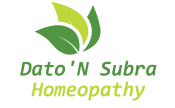
Dato' Dr N.Subra Homeopathy
WHAT IS HOMEOPATHY?
WHAT IS HOMEOPATHY?
Western medicine can be divided into TWO categories namely allopathy and homeopathy. The basic difference between allopathy and homeopathy is that allopathy believes in suppressing the symptoms of a disease, homeopathy seeks to embrace the body's natural response by attacking the root cause of the disease or by encouraging the symptoms of healing. Homeopathy is the practice of medicine that embraces a holistic and natural approach to the treatment of the sick. It is holistic because it treats the patient as a whole.

It is interesting to note that Homeopathy originated from Germany in the late eighteenth century. The name homeopathy is derived from two Greek words. Homeo, meaning similar and pathos, meaning suffering or disease. Dr. Samuel Hahnemann, a German doctor and scholar is the founder and father of homeopathy. He was very disappointed with the results of the allopathic medicines that his colleagues and he were using at that time. He made a firm and final decision to leave his prominent allopathic practice and never to look back and going into it again. He then, performed numerous studies and researches on how to reduce the damaging side effects associated with the medical treatment and avoiding the use of poisons and drugs. He began experimenting on himself and a group of healthy volunteers, giving smaller and smaller medicinal doses and discovered that besides reducing toxicity, the medicines became more effective as the doses were lowered. He further discovered a profound natural law, which became the foundation for homeopathy.

THREE PRINCIPLES OF HOMEOPATHY
After his extensive studies and researches, Hahnemann formulated THREE principles of homeopathy.
It is fundamentally different from conventional or allopathic medicine. Allopathic medicine focuses on suppression of symptoms, whereas, homeopathy seeks to correct the underlying imbalance that caused the symptoms. It achieves this by strengthening the body’s own immune system, thereby allowing the body to heal itself.
The initial visit includes a long questionnaire about the patient’s medical and family history, then a long interview with the doctor, who asks the patient questions pertaining to the health problems. At times, a blood test may be necessary to establish the patient’s general level of health. The initial visit may take between one to two hours.
The main objective of homeopathy is to restore the body to homeostasis or healthy balance. The homeopathy doctor will prescribe a remedy designed to stimulate the internal curative process rather than suppress the symptoms.
Homeopathy recognizes the individual who needs treatment and does not just treat the symptoms but the causes.
Homeopathy treatment involves giving very small doses of substances called remedies which are safe, non addictive and non invasive.
Homeopathy has won laurels in curing chronic diseases and surgical cases
The documented results from thousands of experienced homeopaths and from millions of patients clearly show that these small, individualized doses produce profound health results slowly but surely.
The documented results from thousands of experienced homeopaths and from millions of patients clearly show that these small, individualized doses produce profound health results.
Medication for mankind and animals should not be the sole monopoly of a particular system of medicine. Yet, when it comes to Homeopathy, it is scoffed at as mere quackery. It is interesting to note that Homeopathy treatment sheds not a drop of blood, administers no emetics, purgatives, laxatives or diaphoretics, drives off no external affection by external means, prescribes no hot or unknown mineral baths or medicated clusters, applies no Spanish flies or mustard plasters. It gives with its own hand its own preparations of simple un-compounded medicines, which it is accurately acquainted with. It never subdues pain by drugs. Thus, what is clearly pure in doctrine and practice should be self-evident and all backward sliding to the pernicious routine of the old school that is as much its antithesis as night is to daytime should cease to vaunt itself with the honourable name of Homeopathy.
Homeopathy medicines, which are considered as an alternative or complimentary treatment for diseases, illnesses and medical conditions is fast becoming the medicine of choice for families who are sick and tired of being dependent on drugs that often cause more problems than the original sufferings.
Homeopathy is practised widely in Europe, Asia, South America and many other countries in the world. It is now gaining acceptance in the United States. Many countries such as England, Germany, Switzerland and even Cuba have incorporated it into their public health systems.
Homeopathy is approved by Food and Drug Administration (FDA). It is interesting to note that one of the founders of FDA in 1940 was Dr. Royal Copeland who was a homeopathic physician. Unlike modern drugs, homeopathy medicines never had a history of having been forced off the market for adverse reactions.
Homeopathy has a reputation for being preferred by the privileged and famous. These are the people who could afford to select any medicine in the world, yet depended on homeopathy. For example,
the British Royal Family, The Beatles, Mahatma Gandhi, Mother Teresa, John D. Rockefeller, Daniel Webster, Tony Blair, Bill Clinton and many others.
Despite the current popularity of homeopathy, many people fail to understand what it really is. A survey in United Kingdom, for instance, reported that 40 % of the public thought homeopathy meant ‘natural or herbal medicine’. Some are in the opinion that homeopathy originated from India. This is not just misleading; it is, as we will see, quite simply incorrect. But how can we define homeopathy? As it turns out, a good definition of homeopathy is more difficult to provide than anticipated. One might simply state that homeopathy is the school of medicine that was first developed by a German Doctor Samuel Hahnemann (1755–1843). However, this would tell us very little about the nature of homeopathy.